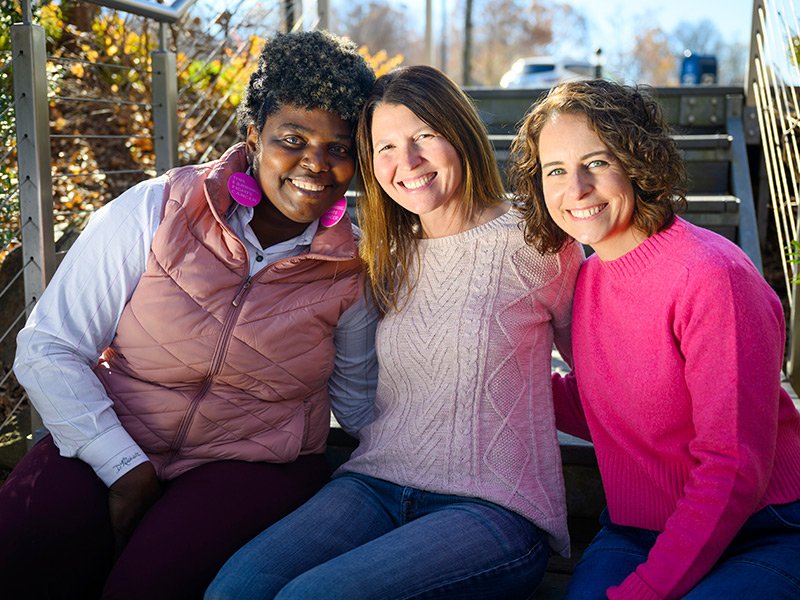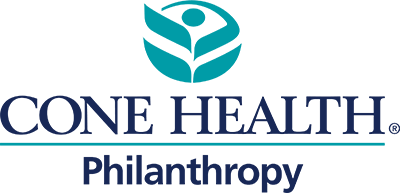Finding Your New Normal is a donor-supported program that helps cancer survivors keep anxiety at bay as they step into the next phase of their lives.

When Angela, Jennifer and Nichole first met, they were past the hard stuff. The shock of the diagnosis. The treatments. The surgeries. By all accounts, they were cancer-free and ready for their lives to go back to normal.
But each woman had the same feelings wash over her in the aftermath of the last year. While they were deeply thankful to be cured, cancer was hardly in the rear view. They felt fearful about recurrence, and surprisingly depressed. Their loved ones celebrated their new health, but they couldn’t seem to access joyful feelings — and that, in turn, led to guilt.
They all faced a similar question: What is their new “normal” and how do they find it?
This is precisely the goal of Cone Health’s program for cancer survivors, aptly named Finding Your New Normal — or FYNN. Backed by the Alight Program Fund, FYNN consists of a six-week session covering a wide range of subjects, including nutrition, emotional well-being, stress management, and addressing lingering side effects. Special guests provide survivors with valuable insights, and long-term survivors share their experiences of life years after recovery. Medical experts are available to answer questions.
Since meeting one another through FYNN, the women have stayed in touch. Early on, they would linger in the Wesley Long Cancer Center parking lot to continue their talks. That turned into a text thread, coffee meetings and, eventually, a joint decision to become Alight Guides — mentors for newly diagnosed cancer patients. Support networks like FYNN and Alight Guides are crucial to recovery. Donors can help expand these vital services that make a measurable difference in fighting disease and achieving wellness.
As moms juggling family life, how has it been dealing with cancer while staying strong and vibrant for your kids?
Angela: A lot of other patients were empty nesters and grandparents, but that’s very different from having young kids at home. I’m a mother of two. My daughter is 11 and my son is 9. I worked to be positive all throughout my treatments for my kids. But when I was done, I thought, ‘What just happened to me?'
Jennifer: My official diagnosis came on Sept. 30, 2022. These dates you don’t forget. They just sit in your mind.
Angela: So true. I got my diagnosis on MLK day in 2022.
Jennifer: I was told I had bilateral breast cancer: a very aggressive cancer in my left breast and a very ‘lazy’ breast cancer in my right breast. I don’t like to be called lazy, but I am happy for my cancer to be called that! I opted for a double mastectomy and didn’t think twice about it. I had surgery on Nov. 15, the day after my son turned 12. We purposely waited until after his birthday.
Nichole: When my doctor told me, ‘You have cancer,’ I said, ‘No, I do not have cancer. I only take possession of things I intend to keep. I have this phone. I have this purse. But the cancer is yours and you’re going to take it.’ I had to keep a positive attitude, especially for my youngest. He has social pragmatic communication disorder and we made sure he didn’t know until my treatment was over. He saw me going through the process, but I never put a name to it. I controlled the narrative for him.
The FYNN program is essential in helping patients cope with the emotional toll of the cancer journey. Did you personally face moments that felt especially tough or challenging during your experience?
Nichole: During my cancer journey, one of the hardest things was looking at myself in the mirror when everything that I thought made me beautiful was gone. I had no hair. No eyebrows. My eyelashes even fell out. When you look in the mirror, you see this alien. You don’t know who this person is looking at you. You know who you are, but you don’t recognize the person looking back at you.
Angela: I also lost all of my hair. My hair was always a big part of me; it was long and full and I loved it. I didn't want the whole world knowing I was sick, so I opted for a wig, which we called Moira because I love Schitt’s Creek. My kids were like, ‘Is Moira going to the beach with us? Is Moira going to the grocery store?’ It was always about Moira.
Humor is good medicine.
Angela: Yes, especially when you have setbacks that extend your time in treatment. I had low platelets and then I got COVID-19. But there were silver linings all along the way. Meeting these ladies is one of them.
Individually and as a group, you’ve been through a lot: chemotherapy, radiation, several surgeries. But you’ve all been told you’re in remission, is that right?
Nichole: Well, I don’t believe in ‘remission’. For me, the term is ‘cancer-free’ and that is how I insisted it appear in my chart.
When you were told you were cancer-free, what was that like?
Jennifer: After 33 radiation sessions, I was told that I was done, but I didn’t feel done. I had a lot of uncertainties. My oncologist — bless him — he hears from me all the time, with all of these questions and fears. This experience definitely sets you in a place that is different from your ‘normal.’ I was never fearful of anything until this happened. And I never thought it was going to be me. I didn't realize the impact the whole experience would have on me. You’re so busy from the time you get diagnosed. Then you sit in silence and you have to reflect on what you just went through.
That’s not the reaction that most people expect. We assume being cancer-free is the end goal, the finish line, and everything is good. But that wasn’t completely true, was it?
Angela: I had an amazing support system, but everyone who’d never been through this type of experience assumed, ‘Oh, you’re done. It’s over. You should be back to your normal self.’ You are anything but that. I felt guilty for feeling sad and anxious. I should have been so happy to be done, but I wasn’t. I was in a dark space. The mental and emotional stuff got heavy.
Jennifer: It can get really heavy. I felt a little forgotten and lost. You have to go through the stages of grief, but it’s almost like you go through them backwards. First, you just survive. Then you grieve. You’re no longer busy, you’re just in that silence, sitting in the mess of everything you just went through. I assumed I would be back to my old self. But you don’t anticipate the emotional upheaval that comes with it, and the fact that you can’t return to who you were. When I sat next to Nichole on the first night of FYNN, I realized that she gets it. The camaraderie was truly comforting and made me feel I wasn't alone.
Nichole: At FYNN, you hear stories from others and you realize you’re not alone on this island by yourself. When you meet people who understand, it’s a big moment of clarity. We realized that everyone in the room was in that same phase, and that made me realize I didn’t need to feel guilty.
Jennifer: At first you think, ‘I don’t know these people and they don’t know my journey.’ Some had mastectomies. Some had lumpectomies. Some had radiation, some had chemo, some had both. But we all could understand.
Angela: I can't imagine where I would’ve been had I not had FYNN. It was transformative for me. Not only the information I got, but the relationships and connections I made.
The three of you became especially close. Why do you think that is?
Angela: Probably age. And lifestyles. We’re all moms to younger kids.
Nichole: We’ve been a support system for one another since we met at FYNN. We just lost one of our friends — she passed because of a result of the chemo on her heart. We had to combat the fears that come flooding in when you suddenly lose someone like that, a fellow survivor. But we combat them together.
Jennifer: We were able to be there for each other through that loss and for the good news as well. I just got my panels back from my recent blood test and they were negative. I celebrated that positive milestone with Angela and Nichole. But, definitely, FYNN helps us manage the anxiety and uncertainty that has reigned over all of our lives the last few years.
Angela: Especially because the pandemic was in the middle of our cancer journeys. I had to pause treatment because I got sick with COVID, and when we were in treatment, we couldn’t have visitors with us.
Jennifer: Yeah, I went through everything without my husband coming in with me. It wasn’t until my final surgery that he was able to accompany me. Everything else was just kissing me goodbye at the door.
Nichole: That exacerbates the process, not having family support right beside you.
Angela: But the nurses were amazing.
Jennifer: Definitely.
What inspired all of you to become Alight Guide mentors?
Angela: I saw a need for younger Alight Guides for newly diagnosed patients. I wanted to be that extra level of support and a resource for others going through this, especially moms who are in a similar phase of life. Cone asked me to take the FYNN class first. I thought I was fulfilling a requirement in order to be an Alight Guide, but no: it ended up being transformational.
Nichole: Cancer treatment focuses on the body, but FYNN focuses on the emotional toll that cancer takes. It fills the gap and helps us figure out who we are now, the new us. Once you figure that out, you want to share it with others.
